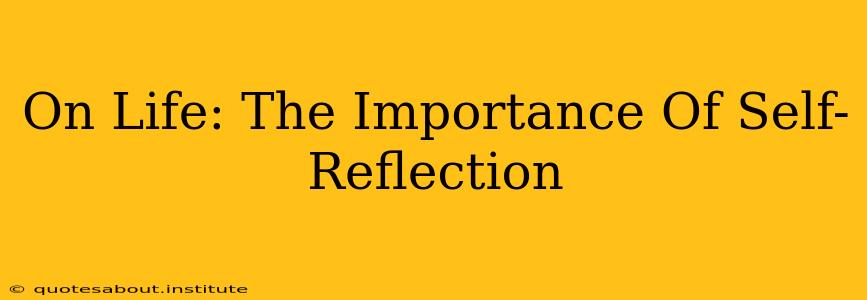Life's a whirlwind. We're constantly bombarded with demands, distractions, and the relentless pressure to keep up. Amidst the chaos, it's easy to lose sight of ourselves – our values, our goals, and even our own feelings. This is where self-reflection becomes crucial. It's not just a trendy wellness practice; it's a fundamental life skill that can dramatically improve our well-being, relationships, and overall success. This article explores the profound importance of self-reflection and offers practical strategies to incorporate it into your daily life.
Why is Self-Reflection Important?
Self-reflection is the process of deliberately examining your thoughts, feelings, and experiences to gain a deeper understanding of yourself and your place in the world. It's about taking a step back from the everyday hustle and bustle to consciously analyze your actions, decisions, and their consequences. The benefits are multifaceted:
- Improved Self-Awareness: By regularly reflecting, you become more attuned to your emotions, motivations, and biases. This heightened self-awareness allows you to make more conscious choices aligned with your values and goals.
- Enhanced Decision-Making: Self-reflection helps you identify patterns in your behavior and decision-making processes. Recognizing these patterns empowers you to make more informed and effective choices in the future.
- Increased Emotional Intelligence: Understanding your own emotions and how they impact your actions is a cornerstone of emotional intelligence. Self-reflection fosters this understanding, leading to stronger relationships and better conflict resolution.
- Greater Personal Growth: Identifying areas for improvement is a key driver of personal growth. Self-reflection provides the necessary introspection to pinpoint weaknesses and develop strategies for self-improvement.
- Stress Reduction: Regular self-reflection can help you process stressful experiences, identify coping mechanisms, and develop strategies for managing future challenges. It allows you to release pent-up emotions and gain a fresh perspective.
What are the Benefits of Regular Self-Reflection?
The benefits extend beyond personal growth. Regular self-reflection can positively impact various aspects of your life:
- Stronger Relationships: Understanding your own needs and emotional responses allows for healthier communication and more fulfilling relationships.
- Improved Productivity: By identifying time-wasting habits and inefficient work patterns, self-reflection can lead to increased productivity and efficiency.
- Greater Resilience: Reflecting on past challenges and successes builds resilience, helping you navigate future difficulties with greater confidence and adaptability.
- Increased Purpose and Meaning: Self-reflection allows you to connect with your values and life goals, leading to a greater sense of purpose and meaning in your life.
How Often Should You Practice Self-Reflection?
There's no magic number. The frequency of self-reflection depends on individual needs and preferences. However, even short, regular periods of reflection are more beneficial than infrequent, lengthy sessions. Aim for a few minutes each day, or a longer session once or twice a week. Consistency is key.
How Can I Start Practicing Self-Reflection?
Several techniques can facilitate self-reflection:
- Journaling: Write down your thoughts, feelings, and experiences. This provides a concrete record of your inner world and allows you to track patterns and progress.
- Mindfulness Meditation: Mindfulness practices encourage present moment awareness, providing a fertile ground for self-observation and reflection.
- Guided Self-Reflection Prompts: Use prompts like "What was my biggest challenge today?", "What am I grateful for?", or "What could I have done differently?" to guide your reflection.
- Spending Time in Nature: Nature has a calming effect that can facilitate introspection and self-awareness.
What are Some Examples of Self-Reflection Questions?
Effective self-reflection involves asking thoughtful questions. Here are some examples:
- What are my strengths and weaknesses? This helps identify areas for growth and development.
- What are my values and how are my actions aligning with them? This helps ensure your actions reflect your true self.
- What are my goals, and what steps am I taking to achieve them? This helps maintain focus and track progress.
- How am I managing stress and challenges? This allows for identification of effective and ineffective coping mechanisms.
- What am I grateful for? This fosters positivity and appreciation.
How Can Self-Reflection Improve My Relationships?
Self-reflection is key to building healthy relationships. By understanding your own emotional patterns and communication styles, you can communicate more effectively and resolve conflicts more constructively. It fosters empathy and understanding, strengthening your bonds with others.
How Does Self-Reflection Lead to Personal Growth?
Self-reflection provides the crucial self-awareness needed for personal growth. It enables you to identify areas for improvement, set realistic goals, and develop strategies to achieve them. It allows for honest self-assessment, paving the way for continuous development and a more fulfilling life.
By integrating self-reflection into your daily routine, you embark on a journey of continuous self-discovery and growth. It's an investment in yourself that yields immeasurable rewards, empowering you to live a more meaningful, fulfilling, and purposeful life. Remember, it’s a process, not a destination. Be patient with yourself, and enjoy the journey of self-discovery.

